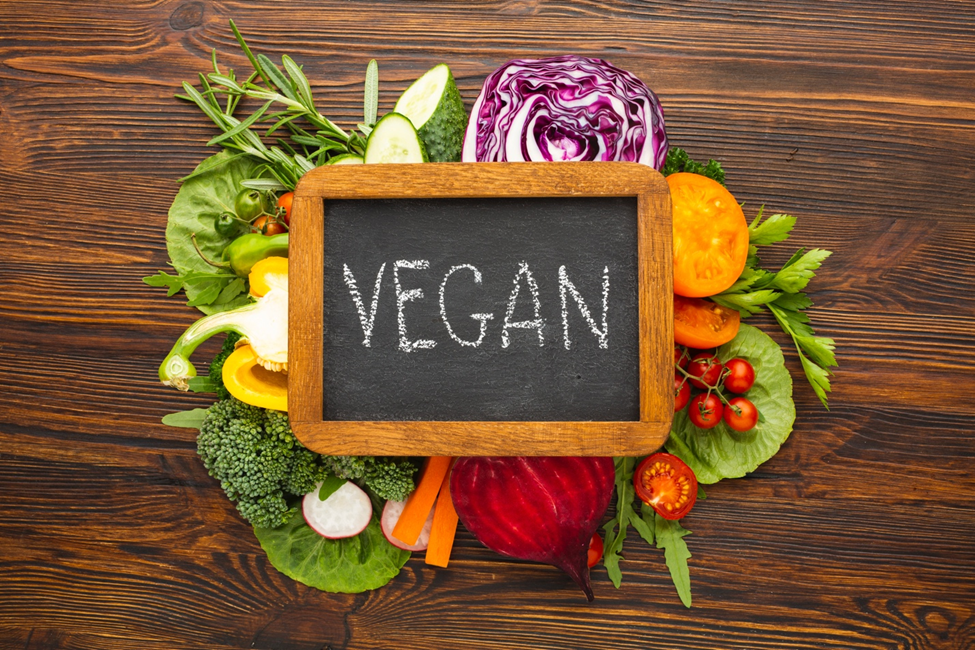“Explore the world of veganism with our comprehensive article. Discover the benefits of a vegan lifestyle, delicious plant-based recipes, and tips for a sustainable and cruelty-free existence. Your go-to source for all things vegan!”
Welcome to the world of veganism, where compassion meets health and sustainability. In this guide, we’ll break down the basics of veganism, tailored specifically for those in India.
Vegan is one of the most trending words on the Internet today. Everybody is making videos about vegan recipes, writing blogs about encouraging people to choose veganism and why being vegan is a better way of living. You must have seen one of those, right? If you are not familiar with the term, you must be thinking what are they talking about?
So, let’s learn about all things vegan together!
What is Veganism?
Veganism is a lifestyle and dietary choice where people choose to avoid any kind of animal-derived products; it may be in their diet, cosmetics and any products that are made by any kind of animal exploitation. Vegans embrace a plant-based diet centered on vegetables fruits, nuts, grains and seeds. They make this choice for ethical reasons, seeking to reduce harm to animals, minimize environmental impact, and promote better health. A vegan is a person who adheres to this lifestyle, consciously excluding all animal-derived products from their consumption and daily routines.
How can a Vegan diet help in weight loss?
A vegan diet can be tailored to support both weight loss and weight gain goals, depending on how it’s structured and the choices made within the diet.
Lower Calorie Density:
Plant-based foods like fruits, vegetables, legumes, and grains tend to be lower in calorie density, meaning you can consume larger volumes for fewer calories. This can help control overall calorie intake.
High Fiber Content:
Vegan diets are typically rich in fiber, which promotes satiety and helps control appetite. Fiber also slows down digestion, preventing blood sugar spikes and crashes.
Reduced Saturated Fat:
A well-planned vegan diet often contains lower levels of saturated fat compared to animal-based diets. This can contribute to lower calorie intake and improved heart health.
Increased Plant Proteins:
Plant-based protein sources like beans, lentils, tofu, and tempeh can help with muscle preservation during weight loss, preventing muscle loss typically associated with calorie restriction.
Healthy Fats:
Vegan diets often include sources of healthy fats such as avocados, nuts, and seeds, which provide essential nutrients and contribute to a feeling of fullness.
Whole Foods:
A whole-food, plant-based diet focuses on unprocessed foods, reducing intake of added sugars and refined carbs that can contribute to weight gain.
How can Vegan diet help in weight gain?
Calorie-Dense Foods:
While a vegan diet can be lower in calorie density, it’s still possible to consume calorie-dense plant foods like nuts, seeds, avocados, and dried fruits to increase calorie intake.
Larger Meal Portions:
Vegan meals can be larger in volume due to lower calorie density, allowing for larger portions without excessive calorie restriction.
Protein Sources:
Vegans can choose protein-rich foods like beans, lentils, tofu, tempeh, and seitan to support muscle growth and repair.
Healthy Fats:
Foods rich in healthy fats, such as nut butters and avocado, can add extra calories to meals.
Nutrient-Dense Snacks:
Snacking on nutrient-dense vegan options like trail mix, smoothies with added nuts or seeds, or energy bars can boost daily calorie intake.
Meal Frequency:
Eating more frequent meals and snacks throughout the day can help increase calorie intake.
Now, you must think that you might have to make a lot of change in your grocery list and in your budget to become a vegan, right? Wrong! Here is a list of 20 Indian food items that are already vegan.
- Dal (Lentil) Curry
- Roti (Indian Flatbread)
- Vegetable Biryani
- Chana Masala (Chickpea Curry)
- Aloo Gobi (Potato and Cauliflower Curry)
- Poha (Flattened Rice)
- Masala Dosa (Crispy Rice Crepe)
- Baingan Bharta (Roasted Eggplant Curry)
- Bhindi Masala (Okra Curry)
- Tamarind Rice
- Tofu Tikka Masala
- Mixed Vegetable Sabzi
- Jeera Rice (Cumin Rice)
- Rajma (Kidney Bean Curry)
- Chole (Chickpea Curry)
- Methi Thepla (Fenugreek Flatbread)
- Vegetable Pulao
- Aloo Paratha (Stuffed Potato Flatbread)
- Samosa (Potato-filled Pastry)
- Dhokla (Steamed Chickpea Flour Cake)
Feeling hungry? With all this food talk? I am too, so here are some my favorite quick recipes for you that you can follow while reading and learning from this article.
-
Aloo Gobi (Potato and Cauliflower Curry):
- Sauté cumin seeds, onions, and garlic in oil.
- Add diced potatoes and cauliflower florets.
- Stir in turmeric, cumin, coriander, and chili powder.
- Add chopped tomatoes and cook until soft.
- Finish with fresh cilantro. Serve with roti or rice.
-
Chana Masala (Chickpea Curry):
- Sauté onions, garlic, and ginger in oil.
- Add chickpeas, diced tomatoes, and spices like cumin, coriander, garam masala, and paprika.
- Simmer until flavors meld. Garnish with cilantro and serve with rice or naan.
-
Vegetable Biryani:
- Sauté sliced onions, ginger, and garlic in oil until fragrant.
- Add mixed vegetables and cook briefly.
- Stir in biryani spices and basmati rice.
- Cook with vegetable broth until rice is tender. Garnish with fried onions and serve with raita.
-
Baingan Bharta (Roasted Eggplant Curry):
- Roast eggplants until skin is charred.
- Peel and mash them.
- Sauté onions, tomatoes, and spices in oil.
- Add mashed eggplant and cook until well blended.
- Garnish with cilantro and serve with roti or naan.
-
Masala Dosa (Crispy Rice Crepe with Potato Filling):
- Make dosa batter by mixing rice and urad dal (black gram) and fermenting it.
- Spread dosa batter thinly on a hot griddle to make a crispy crepe.
- Fill with spiced mashed potatoes. Serve with coconut chutney and sambar.
-
Tofu Tikka Masala:
- Marinate tofu cubes in a mixture of yogurt (use dairy-free yogurt for a vegan version), ginger, garlic, and spices.
- Grill or sauté until tofu is golden.
- Simmer in a tomato-based sauce with spices. Serve with rice or naan.
-
Poha (Flattened Rice):
- Rinse poha and set aside.
- Sauté mustard seeds, curry leaves, and chopped vegetables in oil.
- Add turmeric and poha, stir until heated through.
- Garnish with cilantro and serve with a squeeze of lemon.
Why are people choosing vegan lifestyles more these days?
Prominent figures, including celebrities and athletes, have embraced veganism and advocated for its benefits, raising its profile and influencing others.
The perception that a well-balanced vegan diet can have health benefits, including reduced risk of heart disease, certain cancers, and type 2 diabetes, has led many to embrace veganism for better health.
People are increasingly aware of the environmental impact of animal agriculture, including deforestation, greenhouse gas emissions, and water consumption. Choosing a vegan diet is seen as a way to reduce one’s environmental footprint.
There are many more reason why people choose to adopt a vegan lifestyle. Sometimes it’s ethical values and sometimes its health concerns but in the end it’s a persona choice.
Further Information on Veganism in India that might help you more on your holistic journey:
Books:
- “The Vegan Kitchen: Bollywood Style!” by Anuradha Sawhney: A cookbook that adds an Indian touch to vegan recipes.
- “Vegan Richa’s Indian Kitchen” by Richa Hingle: Offers a variety of vegan Indian recipes with flavorful twists.
Blogs and Websites:
- VeganFirst.com: A comprehensive online platform with articles, recipes, and resources on veganism in India.
- The Green Stove: A vegan food blog with a focus on Indian cuisine and plant-based recipes.
- Vegan Outreach India Blog: Features articles, recipes, and tips for those interested in veganism in India.
- HappyCow: An international website and app that can help you find vegan and vegan-friendly restaurants and stores in your area, including those in India.
- Indian Vegan Recipes: A website offering a collection of vegan recipes inspired by Indian cuisine.
A pro tip: Educate, Don’t Preach: Share information about veganism when asked, but avoid preaching or criticizing others’ choices. Focus on the positive aspects of your lifestyle.



